Pandemic Heroes: This IIT-Delhi alumnus, who worked with the UN, is now reaching out to the needy amidst COVID-19
Besides contributing to the education and development of underprivileged students across India through his NGOs, 54-year-old Pratik Kumar, an alumnus of IIT-Delhi is providing food, ration, and other necessities to over 7,500 families during the pandemic.
India is a country with a 1.3 billion people population, but around 22 percent of them have been living below the poverty line. The outbreak of the COVID-19 pandemic has only made it worse for most people.
With the government declaring multiple lockdowns starting from late March this year, economic activities came to a grinding halt and businesses as well as industrial set-ups began shutting operations. Not only has this affected the economy to a large extent, but also wiped out jobs of millions of daily wage workers and migrant labourers.
According to Centre for Monitoring Indian Economy (CMIE), the pandemic left more than 12 crore individuals fending for themselves and their families. Lack of access to food, water and other essentials has constantly been on the rise and continues to be so.

54-year-old Pratik Kumar.
Moved by these harsh realities, Pratik Kumar, an alumnus of IIT-Delhi, rose to the occasion and decided to dedicate himself to the noble cause of providing food and ration to some of the most underprivileged sections of society.
The 54-year-old who spent three decades of his career working initially for the Ministry of Health and Family Welfare, Government of India, and then at the United Nations, started out on his own and established two non-governmental organisations. While the seeds for Prayatna were sown in 2003, he instituted Sashakt Foundation in 2016.
Well, even during the pandemic, not only did Pratik and his team continue to work for the welfare of the marginalised communities through their NGOs, they also extended their endeavour to cater to the needs of the destitute.
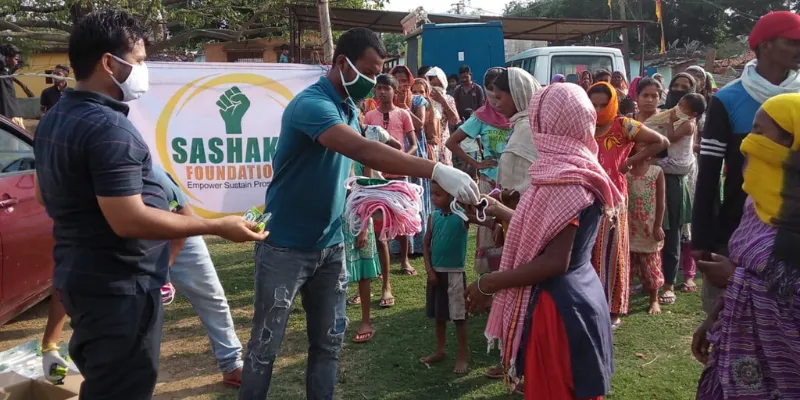
Masks and ration being distributed to the needy by Sashakt Foundation volunteers.
With the support of Sashakt Foundation, on March 25, 2020, Pratik started off by setting up a few kitchens in Mayur Vihar. By the end of April, he had started eleven of them across Gurgaon, Noida, Bihar, Odisha and Delhi and distributed more than two lakh meals. Besides this, Pratik has also been in the forefront of handing out ration kits to thousands of families.
“A whole lot of people were experiencing severe economic distress owing to coronavirus. The loss of jobs made them hapless. I simply could not sit tight after witnessing all this. Hence, I decided to lend a helping hand to people who needed it the most,” Pratik Kumar tells SocialStory.
Uplifting people
Pratik got together several volunteers to work at the kitchens and deliver food and ration to the daily wage workers, migrants and other underprivileged individuals. Feeding India, a Delhi-based NGO, as well as ITC sponsored funds for the ration kits consisting of rice, wheat, sugar, oil, spices and pulses and costing Rs 650 each.
The Azim Premji Foundation too chipped in for the relief operations.
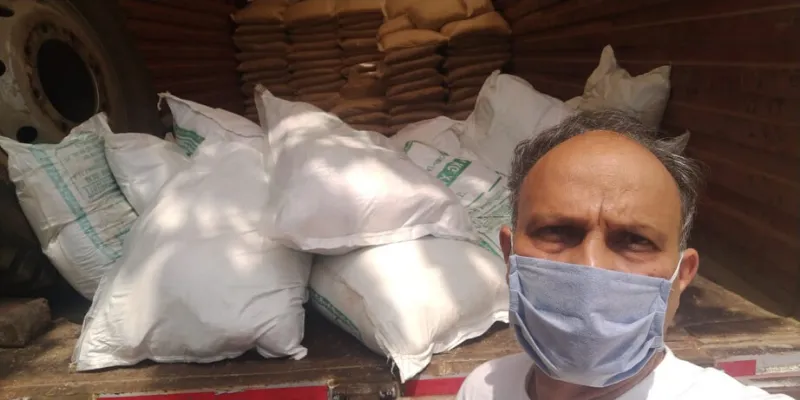
Ration being loaded for distribution.
“All in all, we managed to give away around 85 tonnes of ration across seven states. Since many hospitals were facing a shortage of PPE kits, we began to arrange for those as well. We worked with the health department to identify the needs of around 120 healthcare units in India and helped with the provision of 25,000 masks and face shields as well as 11,000 PPE kits,” says Pratik.
Through the course of this, Pratik along with members of Sashakt Foundation enabled transgenders, daily wage workers and other unemployed youth in rural areas earn a livelihood. They trained them in making masks, soaps and hygiene products.
One of the major challenges that has been standing in the way of Pratik during this social drive is the lack of funds.
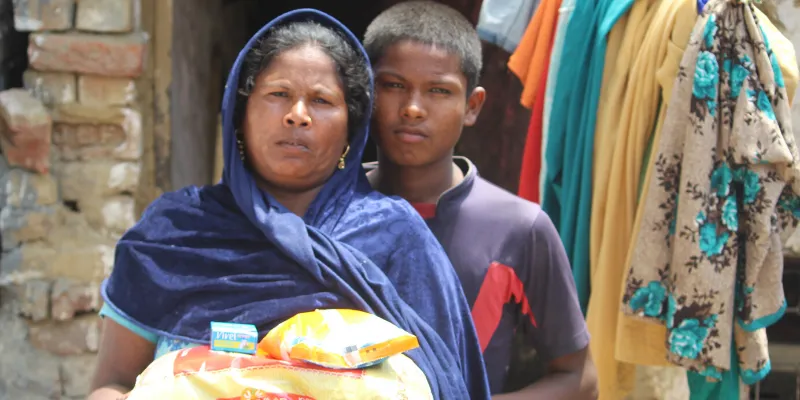
A woman and her son after receiving ration kits as part of the COVID-19 relief initiative.
“We did receive around Rs 50 lakh from NGOs and corporates, however, most of it is drying up. The focus of a lot of CSR teams has been on helping people in metropolitan cities. When it comes to rural India, they tend to shy away. Besides, several organisations had already made huge contributions to the PM Cares Fund in the beginning of the lockdown and hence refused to donate towards other causes later,” notes Pratik.
If Pratik is able to garner more funds and resources in future, he intends to pave the way for the establishment of micro and nano enterprises. He is already laying out plans to launch an employment programme specifically for migrants who have returned to their hometowns in places like Ranchi, Gaya, Mirzapur and parts of Noida.
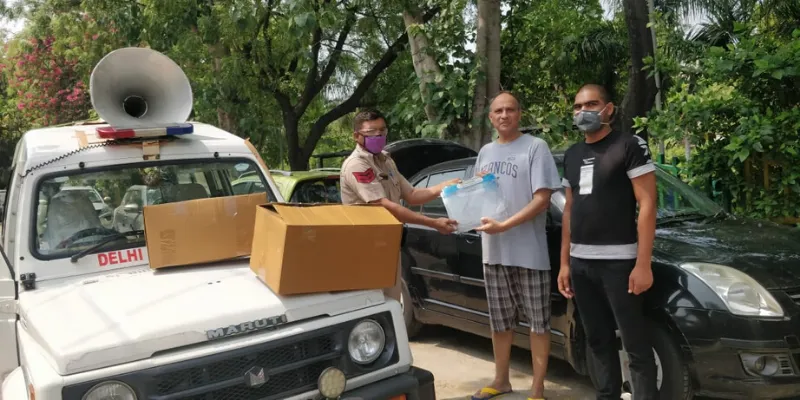
Pratik Kumar donating protective gear to the Delhi police.
“Through the NGO Prayatna, we will be mapping the skill sets of unemployed migrant workers to jobs so that they can begin earning an income and support their families during the pandemic. It breaks my heart to see people struggling for basic necessities. I would have definitely done a lot more if not for the constraint in funds,” he says.
An inspiring journey
Pratik was born in the village of Bhagalpur in Bihar, but raised in the city of Dhanbad. He took up electrical engineering from IIT-Delhi in 1984, and then went on to work in a private sector firm. Very soon, he left his job of designing integrated circuits and enrolled for UPSE in 1991.
“I always had an inherent calling to work towards the upliftment of the society at large. I wanted to touch the last mile and positively impact the lives of people. And, I could not think of a better way to do that during that time than by joining the civil services,” Pratik quips.
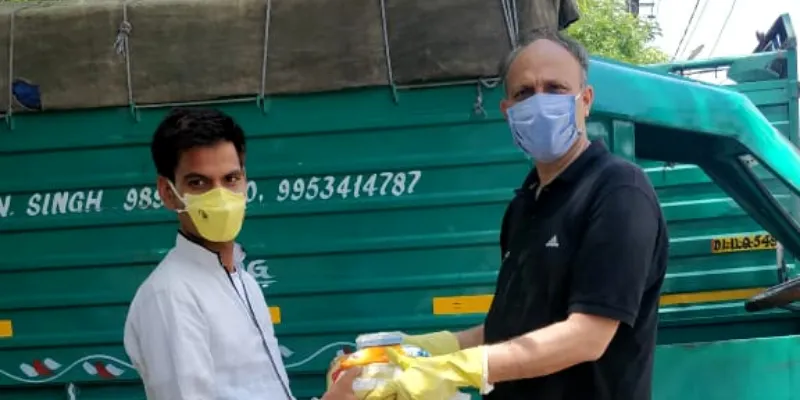
Pratik giving away a ration kit during the pandemic.
After getting selected to the Information Services, Pratik decided to render his services to the Ministry of Health and Family Welfare under the National AIDS Control Organisation. Later, he moved to work with the United Nations on multiple drug control programmes across South Asia.
Over a period of time, Pratik started to get disillusioned with the bureaucracy and decided to work on ground within the social sector space. He joined Magic Bus, a non-profit organisation that enables children to complete their education and obtain jobs in the organised sector. In a span of four years, Pratik raised the pedestal of the organisation and expanded its reach globally.
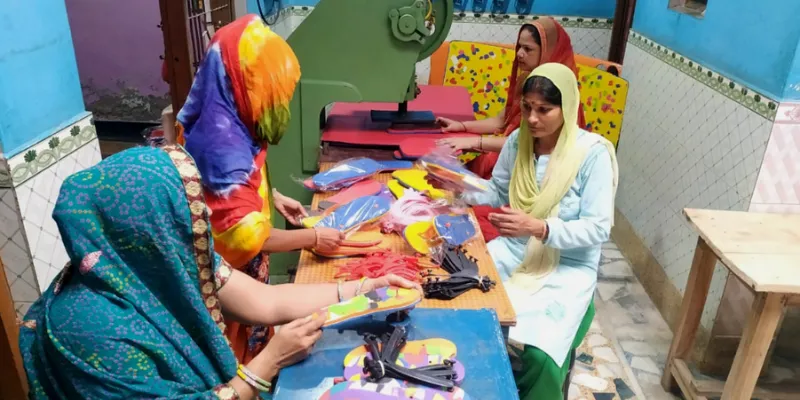
Women making a living by producing footwear as part of Prayatan's programme.
Both the NGOs founded by Pratik focus broadly on providing education and life skills to needy children, especially girls, encouraging sustainable development at the school as well as community level and also equipping the younger generation with livelihood opportunities. And, together, the organisations and their programmes have touched the lives of over one lakh individuals.
Edited by Javed Gaihlot








